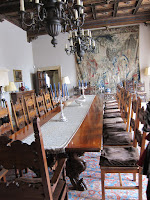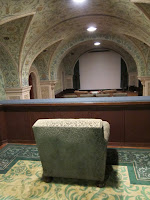 |
| Revising the Croatian Penal Code |
[I am in Croatia thanks to a Fulbright grant. This blog consists solely of my personal reflections and opinions and not those of the U.S. State Department or the Fulbright program.]
There is a reason that my first post is two weeks after my arrival in Croatia. I left my computer at the security check in Frankfurt. I didn't realize that until I was on the plane from Frankfurt to Zagreb. Panic set in. I spent the first night here imaging that a Russian computer hacker was emptying my bank accounts. Thanks to Sasa, the Fulbright babysitter who knows everything, I was able to confirm the next morning that the computer was in the lost and found. It still took two weeks to get it back but it didn't matter much since I was staying in a dorm room without internet. So much for the experienced world traveler!
The morning after my arrival I went to the first of three days of meetings of the working group revising the Croatian penal code. Croatia is in the final stages of EU accession. There were three experts -- from Germany, Poland and Austria -- who advised the group on whether the revisions would pass muster with the EU.
Later in the week, there was a conference at the law faculty on the relationship between Croatia and the ICTY. The first speaker was the current president of Croatia ,who is also a former member of the law faculty. Despite that fact that he was largely positive about the work of the Tribunal, the press focused on statements he made regarding a long-running dispute between Croatia and the ICTY over the production of artillery logs. The president said that if the logs existed he would know, after all he is the president. This is critical because one of the last remaining hurdles to EU accession is Croatia's record of cooperation with the Tribunal.
Other than that, I spent the rest of the first week fighting jet lag, trying to check my email and finding an apartment. In the meantime, I stayed in a dorm -- brand new room, not exactly convenient. But, there was good news. It forced me to learn a bit about the tram system, which is great (fast, convenient and cheap). There was only one place to eat near the dorm, so I went there everyday. Thankfully the food was good and the bartender was friendly.
More to come on the apartment hunt.
 The main floor of the palace is what you would expect of a royal residence.
The main floor of the palace is what you would expect of a royal residence.




 The main floor of the palace is what you would expect of a royal residence.
The main floor of the palace is what you would expect of a royal residence.


























